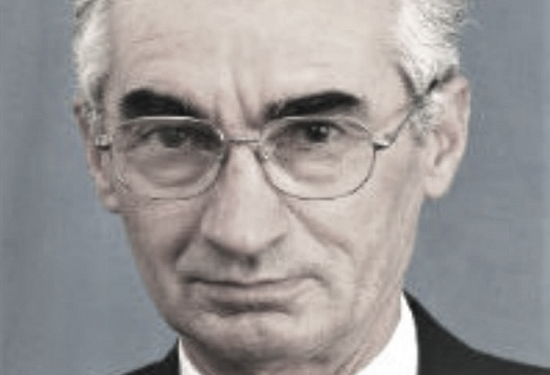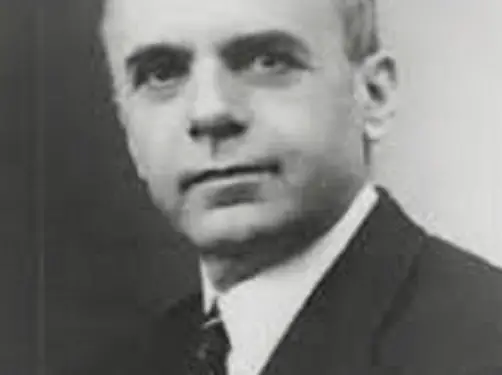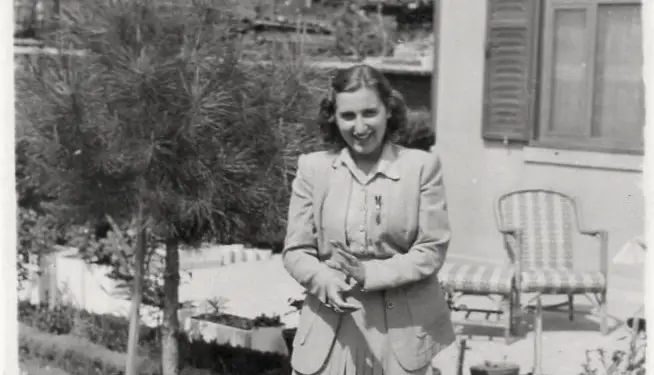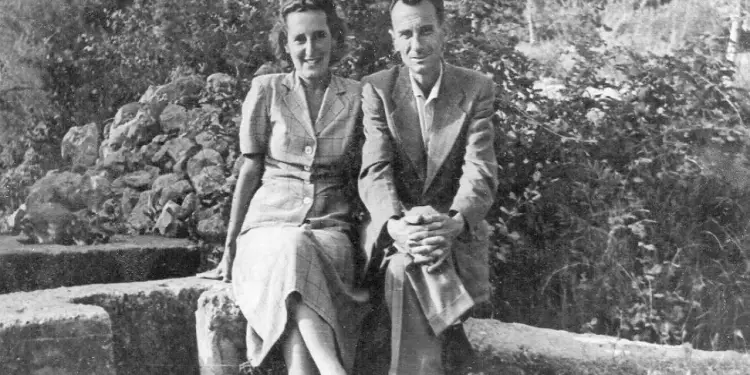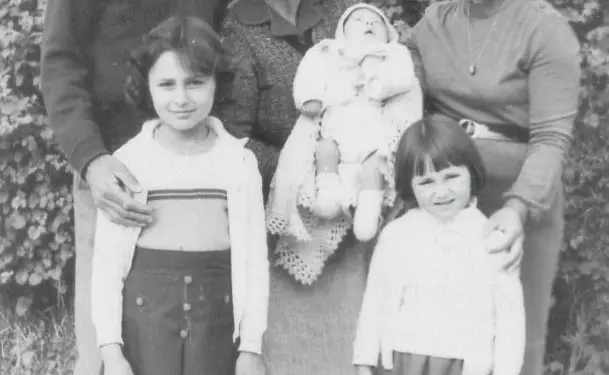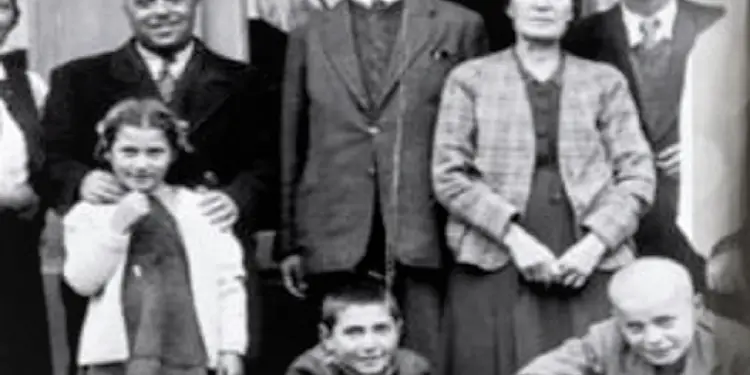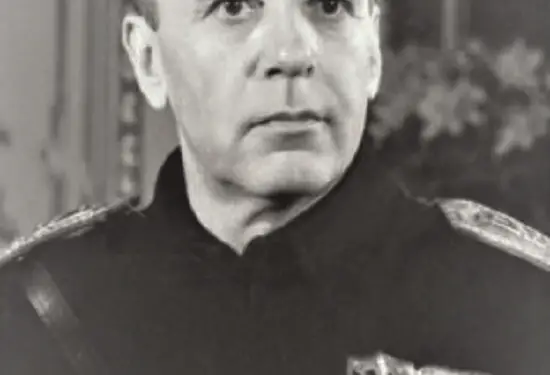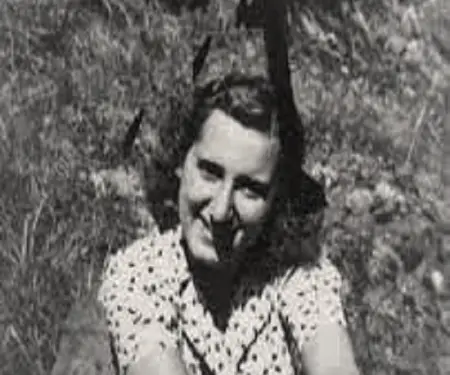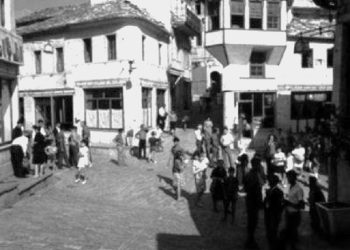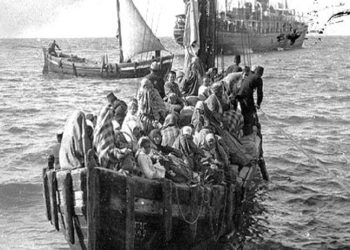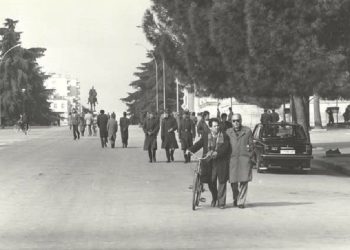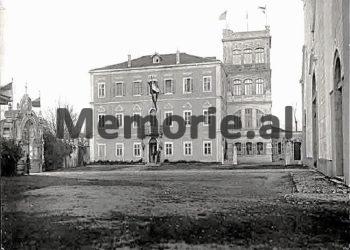By Eugene Merlika
Memorie.al/ On the morning of March 3, 2001, at Rinas airport, a beautiful coffin with a cross on top descended from a plane of the Civil Aviation Company “Alitalia”. In it rested the lifeless body of a lady who, in her eighty-eight years, had spent her life on both shores of the Adriatic. This was the last flight, it was like an invisible bridge connecting the two shores. In Rinas, her husband’s family members, sons, daughters-in-law, nephews, friends, etc., were waiting for her, who would accompany her on the picturesque road to Kruja, to the last residence, in the city cemetery of her husband’s ancestors, Dr. Aslan Merlika.
This lady was Giovannina Çezari, known in Albania as Xhana Merlika. He was born on April 19, 1913, in ancient Bologna with cultural traditions. He was born in a middle-class family with many children, one of those families that constitute the silent majority of a society and at the same time the backbone of a nation. Her father, Frederik, owned a restaurant where the Albanian students of Italy’s oldest university gathered. Among them was a boy from Kruja, Asllan Merlika, who studied medicine. Between the young girl, who went to the restaurant to help her parents, and the student boy, a pure and powerful love was born, which remained so during a life full of vicissitudes.
Love was not hindered by Xhana’s parents and also by Asllan’s older brother, Mustafa, who was like father and mother to him. Asllani was raised and educated under the care of Mustafa, and he had tried to ensure that, even though he was away from a young age, he would preserve his love for his country, and put his knowledge and profession at his service. So, the doctor, newly awarded in Bologna, would return to Albania and start working in his profession in Peqin. Meanwhile, love would be crowned with the marriage of the dark and beautiful Bolognese, she would agree to live in a country she didn’t know and that provided her with much less comfort than her own country, but with the enthusiasm of love, which compensated for everything.
She always stayed by her husband, the boy of her dreams, in good times and bad. He stood by his side in long years of work and deprivation, while in pain and tears he longed for his parents, brothers and sisters that a regime, as cruel as it was immoral, forbade him to see. In long years of terror, when her husband’s people were languishing in the prisons of Burrel or Gjirokastra, in the extermination camp of Tepelena or the internment camp of Lushnja, she would prove courage, bravery, kindness and strength of character, coming to the aid of her brothers-in-law and nephews in prisons and becoming a warm shelter for their orphaned children with living parents. Her proverbial generosity, which strongly relied on the unsparing help of her family from Italy, is known not only in the family environment but also in the social ones of Korça, where Dr. Merlika spent most of her life.
Generosity and strength of character would also come to the fore in moments of great family difficulties, such as her husband’s illness and the years of exile. When the doctor was no longer at work, when cerebral thrombosis and age had turned him into a “worthless” person for the regime, the ax of the Communist State’s dictatorship would not hesitate to strike even in front of the undeniable merits of a talented and conscientious doctor, in whose biography thousands of children’s lives were saved from the claws of death. Thus, on the night of the thirtieth of October 1975, the doctor’s family would experience the cruelty of the endless decisions of the “masters” of the Internment-Deportation Commission.
In the heights of Gora, in the village of Senisht, the five most difficult years of Xhana’s life would pass. With patience and stoicism, she faced those harsh years, as harsh as the nature of mountain Senisht. From civilized Bologna, to a lost village of Gora, this was the unusual parable of her life. It took strength, endurance, character to withstand such a cataclysm. Where did this noble Bolognese woman find the strength to face a situation that would bring tried-and-true men to their knees? Who would help her in her mission at the center of a family, in which she should be a factor of harmony, as a wife of a sick man, as a mother, as a mother-in-law and as a grandmother at the same time? Faith in God, her endless prayers to Jesus, the Virgin of Saint Ndou, those values that were deeply embedded in her heart from her childhood, but which were destroyed and desecrated by a gang of criminals, who unfortunately took the breath of noble Albania.
But her strength also came from love, a love with a capital that does not give in to any difficulty that does not know conditions, interests, calculations, and the love for her adored “Aslanino”. Love was the main constituent element of her being. It extended to the sons and their families but also to other family members of the husband’s relatives, to friends, companions, relatives to the entire social circle in which he lived and beyond to the adopted country as a second homeland. Cruel fate willed that, in those five years of exile without any motivation, she was separated from the main object of her love.
Despair and living conditions aggravated the illness of beloved Asllan, who passed away on December 15, 1978. Born in a mountainous country, in ancient Kruja, he would be buried in another mountainous country, in Senisht. Mountains are usually the graves of the brave and Asllan Merlika was one. He is brave, not because he fought in the trenches killing people, but because he faced a whole life in a regime that was hostile to him, fulfilling his duties as a doctor, as a man, as a parent, as a support and reference point for an entire persecuted tribe, fallen into misfortune, with honesty and a spirit of selflessness. He was also brave because by his side he had his faithful wife, Xhana, whose most powerful weapon in her life was her love for people, respect for their worries, misfortunes and problems. December 1978 cut off Xhana’s arms. Now her life would be mainly going back, diving into the world of memories, but without neglecting her role as a mother and grandmother.
She returns to her country, in Bologna, after almost half a century, on September 20, 1990, to spend the last years of her life. Instead of her parents, she would find the graves and she would accompany her sisters and brothers to the graves, to remain the last one in the family, to accumulate endless pains in her heart. But her great concern was there, in that simple grave, in distant Kruja, in which her “Aslanino” rested. Her wish was that her last home would be there. The place of her birth, childhood and early youth had remained far from her inner world. That other country, for which, in the prime of life, she had decided to go into the unknown that gave her the joy of raising children and living together with her beloved husband that was her world. In that world she wanted to have her own part, in that last apartment, simple as her life had been, to be in education together with him, with her “Aslanino”. Fate wanted her to close her eyes in the hospital of a high place, like the place where her husband passed away, like Kruja where his remains rest.
Perhaps in her desire to rest forever in the Albanian land, in the place that caused her so much pain and sorrow, apart from her love for her husband, the leitmotif of her life, there was another truth. Man remains spiritually connected to the place in which he spends most of his life, even when this life has not been a field of flowers, even when it has been harsh, dark, and painful. Willingly or unwittingly, it is identified with him, because in him, along with the sufferings and shortcomings, he has also known some brief moments of joy, satisfaction, and their totality constitutes what is called human life. This life cannot be erased from the memory nor can the longing for it be drowned, because it remains a part of us.
So Xhana, the noblewoman from across the sea, rests today in the bosom of our Albanian land, that land that gave birth to her love, in her adopted country, in that country that welcomed her with her heart in her hand, when she came as a bride. Since her wedding day, she had kept a memory, a black dress, which she cared for like the eyes of her forehead. Her order had been for that dress to be the last garment in which she would leave this world. That dress would cover her body on the two most marked days of her earthly life, as the oath of love and fidelity that conveyed all time, as in the ancient ballads of the arboreal land.
Today, again with heart in hand, that place welcomed her, to generously give her, again dressed in her wedding dress, the welcome and farewell with all the honor and respect that her white soul deserved. Memorie.al




